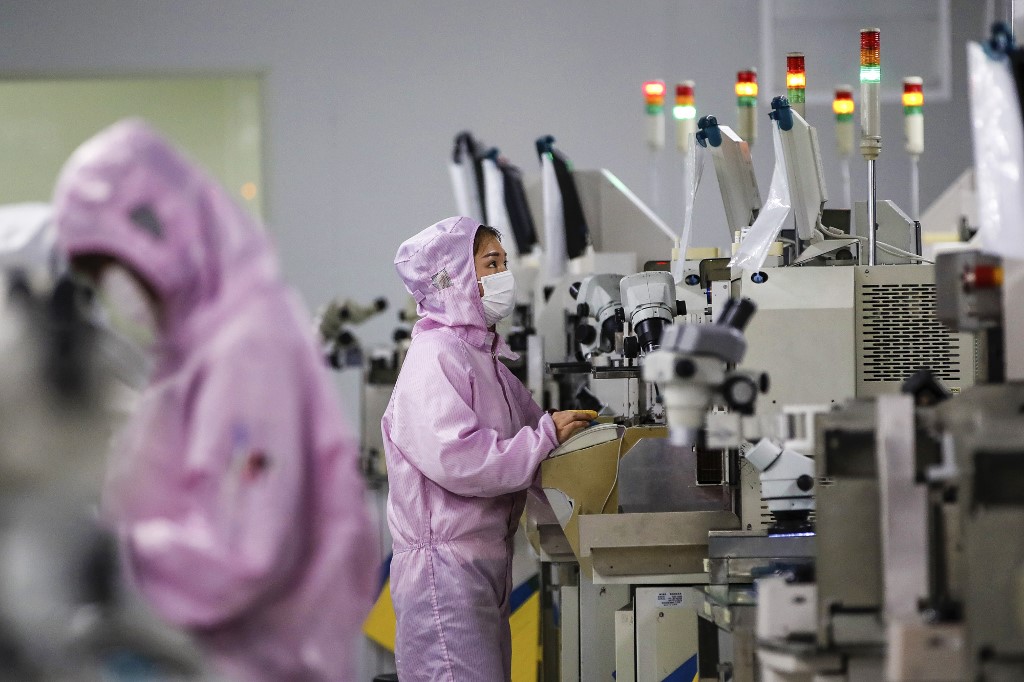(ATF) Chip stocks have rallied since China’s major trade association for the sector said it will set up a working group with its US-based counterpart, as analysts expect the tie-up to help fill a gap for dialogue as US President Joe Biden has shown no sign yet that he wants to tear up tech bans his predecessor put in place.
The Chinese Semiconductor Industry Association (CSIA) announced last Thursday that it will establish a working group with Washington-based Semiconductor Industry Association (SIA).
“The associations of the two countries hope to strengthen communication, and promote deeper mutual understanding and trust through the working group. The working group will follow the rules of fair competition, intellectual property protection and global trade, address the concerns of the semiconductor industry of China and the US through dialogue and cooperation, and make joint efforts to establish a stable and flexible global semiconductor value chain,” the CSIA said in a statement on its website.
China’s chip industry group said each side of the joint working group will be represented by 10 chip companies.
The working group will meet twice a year to exchange information on issues such as trade policy, supply chain security, and encryption.
The date of the first meeting and the companies involved were not given.
However, the website of the SIA made no mention of the working group so far.
Shares in Semiconductor Manufacturing International Corporation (SMIC), the leading chip manufacturer in mainland china, rose as much as 12.4% in Hong Kong shortly after the announcement.
Hua Hong Semiconductor, a rival Chinese manufacturer, also rose 14%, while Hang Seng Tech Index rose 5.2%, marking its largest percentage gain since January 20.
The Philadelphia Semiconductor Index was up 4.2% compared to the 2.6% gain for the broader tech sector.
Stocks of foundry giant Taiwan Semiconductor Manufacturing Company jumped 5.8%, while those of semiconductor equipment companies Lam Research and KLA rose 3.9% and 4.8%, respectively.
Bid to ease bilateral tension
The joint working group between CSIA and SIA is expected to ease the US-China trade tension and help facilitate dialogue, Gao Shiwang, director of industry development at China Chamber of Commerce for Import and Export of Machinery and Electronic Products, said.
“China is one of the the world’s largest semiconductor importers and an important market for American chip companies such as Qualcomm, Intel, Broadcom and Xilinx. The US’s ban on Chinese tech firms has surely impacted these companies’ financial interests… SIA data show that China accounted for 36% of the $193 billion global sales of American semiconductor companies in 2019. The American companies would not want to give up this massive market,” he said.
While talks between Washington and Beijing have yet to progress smoothly, non-government collaboration will help to fill the gap, Gao said.
The CSIA has 774 members that are engaged in semiconductor manufacturing, design, research, applications and education, according to its website. The association’s chairman is Zhou Zixue, SMIC’s chairman. The executives of chip design and manufacturing firms such as Huawei, Tsinghua Unigroup, and Hua Hong are also on its administrative council.
The SIA’s members include US’s IBM, Qualcomm, Intel, as well as international companies such as Samsung, ASML, and TSMC, according to its website.
China is the world’s largest purchaser of semiconductors, but its domestic production of chips is marginal.
Beijing has long been urging local governments and private enterprises to invest in the domestic chip industry, which has long lagged behind those of the United States, Japan, and Korea.
In the previous decade, the government set a goal to produce 40% of the chips it consumes by the year 2020, but analysts say it has missed that target by far.
According to research firm ICInsights, of the $143 billion in chips sold in China in 2020, only $22.7 billion worth were produced in China, and only $8.3 billion was produced by Chinese-headquartered companies.
China’s need to reduce its dependence on overseas chip companies came to light in 2020 when sanctions imposed by the previous Trump administration on Shenzhen-based hardware maker Huawei prevented it from sourcing components, crippling its once-booming smartphone business.
Biden orders review of chip sector
US President, Joe Biden, has been preoccupied by the vaccine rollout since taking office in late January and appears to have left any decision on whether to reverse bans put in place by Trump to his senior officials while he focuses on countering the Covid-19 health crisis at home.
On February 24, the new president signed an executive order for a review of supply chains that will cover semiconductor chips and other sectors. The 100-day review that will cover chips, rare earths, pharmaceuticals and the large capacity batteries that are key for electric vehicles. A broader one-year review will cover multiple other sectors including food production and technology.
Biden said he would seek $37 billion in funding for legislation to supercharge chip manufacturing in the United States as a shortfall of semiconductors has forced US automakers and other manufacturers to cut production.
Indeed, many countries have had to deal with the global chip shortage, which has rattled the electronics sector as various car manufacturers, plus smartphone and gadget makers scramble to get components for their products.
With reporting from Reuters.
ALSO SEE:
- Biden sends warning to China on chips and rare earths
- World’s biggest chipmakers heading to the US
- Taiwan asks TSMC to explain the shortage of semiconductors
- How TSMC could keep selling chips to embattled Huawei despite ban
- TSMC raises 2020 outlook 30% in sign of 5G boost
- Firms poaching TSMC staff as China bids to build fabs from scratch
- China gives up on $20bn Wuhan chipmaking fiasco
























